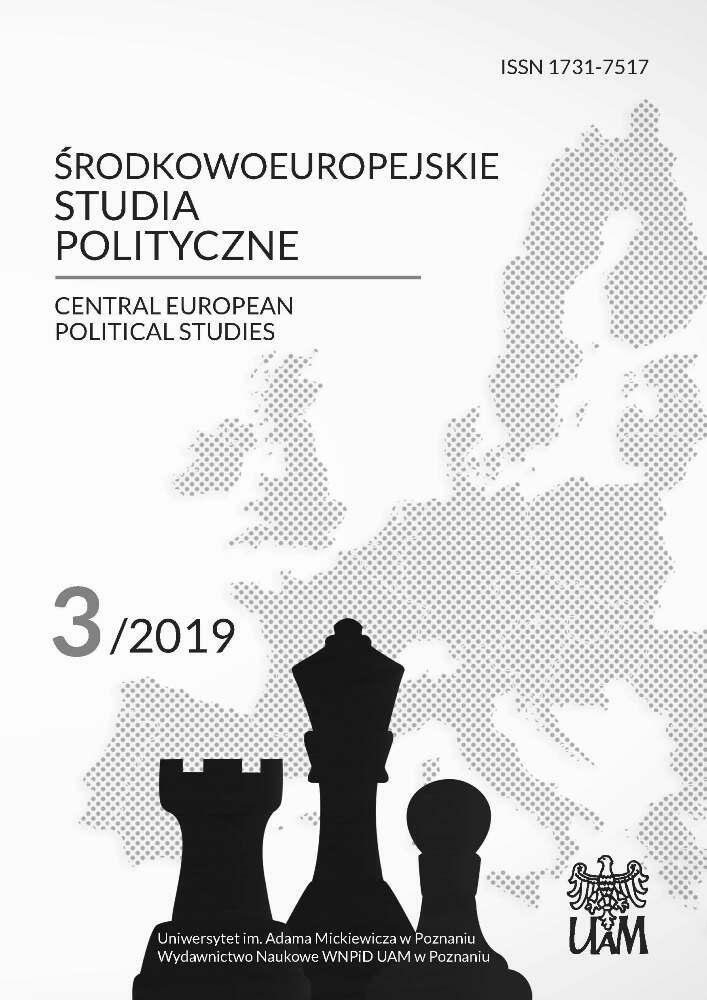Abstract
Performing public tasks as part of multi-level governance, municipal governments in Germany play the most vital role in the network system. As state bodies, they initiate and change the forms of coordination of collective actions. The main issue addressed in this paper is the use of a conceptual grid applied in the deconcentrated structure of public administration in Anglo-Saxon countries for the description of multilevel governance in decentralized forms of public administration. The main aim of this paper is to present how the concept of multi-level governance has been adapted to the specific character of German municipal government and what its essence is. The following research questions are asked to achieve the main aim: What is the difference in the genesis of governance in Germany in comparison to the tradition of Anglo-Saxon countries? How are public tasks performed within the framework of multi-level governance in Germany? What are the organizational and legal forms of performing public tasks? The paper was prepared following the assumptions of the new institutionalism. In order to present ways of performing public tasks in the concept of multi-level governance the functional method was used. This enabled the selection of those tasks that can be implemented by both local government units and self-governing business institutions. Additionally, the institutional method was used to show the specificity of cooperation between municipal governments and other public and private entities. The research on multi-level governance in Germany resulted in three conclusions providing the framework for this paper. Firstly, the emergence of multi-level governance in Germany has been based on top-down activities which occur between the federal states and municipalities. The creation of network systems results from the conviction of the state authorities that the implementation of public tasks is more effective in cooperation with private organizations which are moderated by regulatory entities. Secondly, before implementing multi-level governance on the local level, regional governance has been established at the level of the Lands, allowing the concept of governance to be adjusted to the specific requirements of a federal state. Thirdly, multi-level governance has been embedded in the structure of local government through a specific type of public task (Gemeinschaftsaufgaben).
Funding
The project was financed from the funds of the National Science Center granted on the basis of Decision No. 2012/07/N/HS5/01705.
References
Ansell C. (2000), The networked policy. Regional development in Western Europe, “Governance”, vol. 13, issue 2, pp. 279–291.
Benz A., Fürst D. (2003), Region-Regional Governance Regionalentwicklung, in: Regionen erfolgreich steuern, eds. B. Adamaschek, M. Pröhl, Unversitätsverlag Göttingen, Göttingen, pp. 1–123.
Bevir M. (2011), SAGE Handbook of Governance, SAGE, London.
Böcher M. (2008), Instrumentenwandel in der Umwelt- und Naturschutzpolitik und der Politik zur integrierten ländlichen Entwicklung. Theoretische Grundlagen und Strategien der Praxisumsetzung, Dissertation, Göttingen.
Denters B., Rose L. (2005), Towards local governance?, in: Comparing Local Governance. Trends and Developments, eds. B. Denters, L. Rose, Palgrave Mac Millan, New York, pp. 46–62.
Dolnicki B. (2006), Samorząd terytorialny, Zakamycze, Kraków.
Fürst D. (2001), Regional Governance – ein neues Paradigma der Regionalwissenschaften?, “Raumforschung und Raumordnung”, no. 59, pp. 370–380.
Fürst D. (2004), Regional Governance, in: Governance – Regieren in komplexen Regelsystmen, ed. A. Benz, VS Verlag für Sozialwissenschaften, Wiesbaden, pp. 49–69.
Giessen L., Böcher M. (2009), Rural Governance, forestry, and the promotion of local knowledge. The case of the German rural development programme “Active Regions”, “Small-scale Forestry”, vol. 8, pp. 211–230.
Giessen L. (2010), Regional Governance für ländliche Räume – innovativer Ansatz, politischer Gegenwind und der Weg vorwärtz, “Raumforschung und Raumordnung”, vol. 68, pp. 3–14.
Hausner J. (2007), Od idealnej biurokracji do zarządzania publicznego, in: Wymiary życia społecznego, ed. M. Morody, Wydawnictwo Naukowe Scholar, Warszawa, pp. 493–515.
Hausner J. (2008), Zarządzanie publiczne, Wydawnictwo Naukowe Scholar, Warszawa.
Hooghe L., Marks G. (2001), Types of multi-level governance, “European Integration Online Paper”, vol. 5, pp. 1–24.
Jessop B. (2007), Promowanie dobrego rządzenia i ukrywanie jego słabości. Refleksja nad politycznymi paradygmatami i politycznymi narracjami w sferze rządzenia, “Zarządzanie Publiczne”, no. 2, pp. 5–25.
Kaufmann D., Kraay A., Mastruzzi M. (2009), Governance Matters VII Governance Indicators for 1996–2007, DC World Bank, Washington.
Kopyciński P. (2014), Mechanizm koordynacji w polityce innowacyjnej w świetle koncepcji współzarządzania wielopoziomowego (multi-level governance). Przykład województwa małopolskiego i świętokrzyskiego, “Zarzadzanie Publiczne”, no. 4, pp. 31–46.
Książek E. (2011), Partnerstwo publiczno-prywatne, in: Prawno organizacyjne aspekty zarządzania w gminie, eds. A. Kożuch, M. Stych, Wydawnictwo Akademii im. Jana Długosza w Częstochowie, Częstochowa, pp. 1–266.
Kuhlmann S., Bogumil J., Grohs S. (2008), Evaluating Administrative Modernization In German Local Governments. Success of Failure of the “New Steering Model?”, “Public Administration Review”, vol. 5, pp. 851–863.
Kuhlmann S., Bogumil J., Grohs S., Ohm A. (2007), Zehn Jahre Neues Steuerungsmodell: eine Bilanz kommunaler Verwaltungsmodernisierung, Edition Sigma, Berlin.
Lepsius O. (2002), Geld als Schutsgut der Eigentumsgarantie, “Juristen Zeitung”, vol. 757, pp. 313–321.
Mutius A. von, Henneke H.-G. (1985), Kommunale Finanzausstattung und Verfassungsrecht. Dargestellt am Beispiel der nordrhein-westfälischen Gemeindefinanzierungsgesetze 1983 und 1984, Recinger, Siegburg.
Powell W. W. (1990), Neither market or hierarchy. Network forms of organization, “Research in Organizational Behaviour”, vol. 12, pp. 295–336.
Richter D. (2006), Kommunales Vermögen und seine Verwaltung, in: Recht der Kommunalfinanzen. Abgaben, Haushalt, Finanzausgleich, ed. H.-G. Henneke, C.H. Beck, München.
Scharpf F. (2014), Zapiski o teorii zarządzania wielopoziomowego w Europie, “Zarządzanie Publiczne”, no. 4, pp. 76–99.
Strumińska-Kutra M. (2012), Rola badań społecznych w refleksyjnych procesach metarządzenia. Zarys perspektywy teoretycznej i metodologicznej, “Zarządzanie Publiczne”, no. 4, pp. 17–29.
Sześciło D. (2012), Niemiecki Steuerungsmodell. Nowe zarządzanie publiczne w samorządzie lokalnym, “Samorząd Terytorialny”, no. 1–2, pp. 42–52.


